The Royal Society of New South Wales latest news:
The Royal Society of NSW launches its history – 1821 to 1914
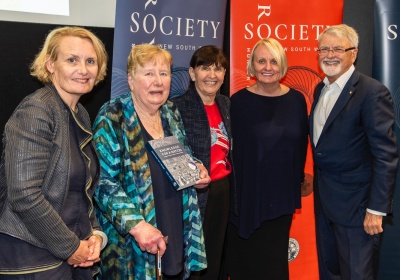 The Governor of NSW, The Honourable Margaret Beazley AC KC, and the NSW State Librarian, Dr Caroline Butler-Bowdon, formally launched the Society’s first book on its history at a ceremony held at the State Library of NSW on 2 October 2024. Titled Knowledge for a Nation: Origins of the Royal Society of New South Wales, the 320-page volume was written by historian Dr Anne Coote and was published by the Society with the support of a Create NSW cultural grant managed by the Royal Australian Historical Society.
The Governor of NSW, The Honourable Margaret Beazley AC KC, and the NSW State Librarian, Dr Caroline Butler-Bowdon, formally launched the Society’s first book on its history at a ceremony held at the State Library of NSW on 2 October 2024. Titled Knowledge for a Nation: Origins of the Royal Society of New South Wales, the 320-page volume was written by historian Dr Anne Coote and was published by the Society with the support of a Create NSW cultural grant managed by the Royal Australian Historical Society.
From left to right in the image are: Dr Caroline Butler-Bowden (NSW State Librarian), Dr Anne Coote (book author), Dr Susan Pond (President of the RSNSW), Dr Davina Jackson (RSNSW publisher) and Emeritus Professor Peter Shergold (RSNSW Vice-President).
The Royal Society of NSW launches its New England and North West Branch
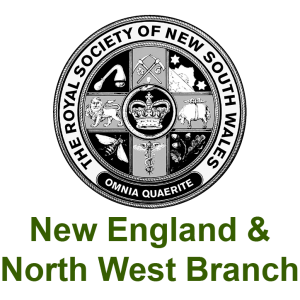 The Royal Society of NSW launches its latest Branch, the New England and North West Branch based around Armidale, NSW, on Monday 25 November 2024 at 5:30 pm AEDT. The launch will be followed by the inaugural meeting of the Branch comprising two short talks on Women in STEM presented by Dr Amy Moss and Dr Marissa Betts followed by a panel session.
The Royal Society of NSW launches its latest Branch, the New England and North West Branch based around Armidale, NSW, on Monday 25 November 2024 at 5:30 pm AEDT. The launch will be followed by the inaugural meeting of the Branch comprising two short talks on Women in STEM presented by Dr Amy Moss and Dr Marissa Betts followed by a panel session.
Live streaming will be available at no cost (registration required – link to follow). For more information visit the relevant page on the Royal Society of NSW website.
The Royal Society of NSW and Learned Academies Forum 2024 – THREATS TO DEMOCRACY
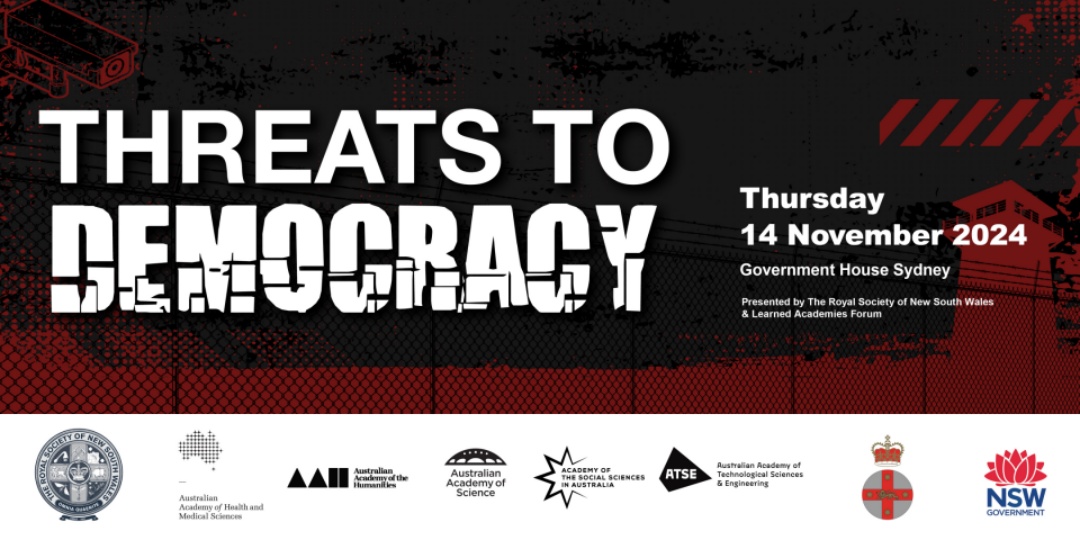 In 2024, the greatest number ever will have voted in ‘democratic’ elections, in Argentina, India, Indonesia, Mexico, the UK, the USA, and others. At the same time, there have been deep questions about the success of democracies. Is democracy important in the twenty-first century and if so, why? From its Greek origins, through Roman republican models to the many and varied structures of contemporary states, democracy has mutated but survived.
In 2024, the greatest number ever will have voted in ‘democratic’ elections, in Argentina, India, Indonesia, Mexico, the UK, the USA, and others. At the same time, there have been deep questions about the success of democracies. Is democracy important in the twenty-first century and if so, why? From its Greek origins, through Roman republican models to the many and varied structures of contemporary states, democracy has mutated but survived.
Democracy as a political framework has been influential in creating the global rules-based order that has dominated international affairs for half a century. Now the presuppositions of the rules-based order are in question and democracy itself is under threat. Attitudes to democracy and political power have changed and the nature and structures of political communities are in flux.
A diverse group of eminent experts will discuss these issues in front of a live audience in Government House Sydney on Thursday 14 November 2024 from 9:00 am to 5:00 pm. Live streaming will be available at no charge (link to follow). For more information and to access recordings of the event, please visit the Royal Society of NSW website.
The Royal Society of NSW launches a new lunchtime series: Provocations and Inspirations
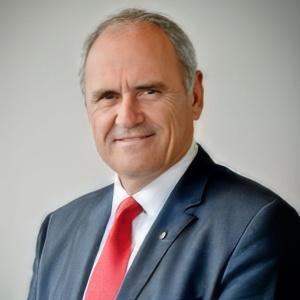 This is the first in a new, exciting series of lunchtime activities that, over a period of 12 to 18 months, will explore a highly complex topic of major importance to Australia today. The aim of the series is to explore the topic in-depth and, ultimately, to identify ways to influence the broader discourse. The series seeks to provoke and inspire action.
This is the first in a new, exciting series of lunchtime activities that, over a period of 12 to 18 months, will explore a highly complex topic of major importance to Australia today. The aim of the series is to explore the topic in-depth and, ultimately, to identify ways to influence the broader discourse. The series seeks to provoke and inspire action.
The first meeting will discuss Inequality in Australia with Dr Ken Henry AC, Chair, Nature Finance Council, Former Secretary to the Treasury and Former Chair, National Australia Bank. It will be held on Tuesday 22 October 2024 at 12.15 for 12.30 – 2.00 pm AEDT at the Union University and Schools Club 25 Bent Street Sydney. Cost $60 (RSNSW members), $70 (non-member guests). Registration essential by 2.00 pm on Wednesday 16 October 2024. Max: 50 attendees.
For information visit the relevant page on the Royal Society of NSW website.
The Royal Society of NSW and Learned Academies Forum 2023 – OUR 21st CENTURY BRAIN
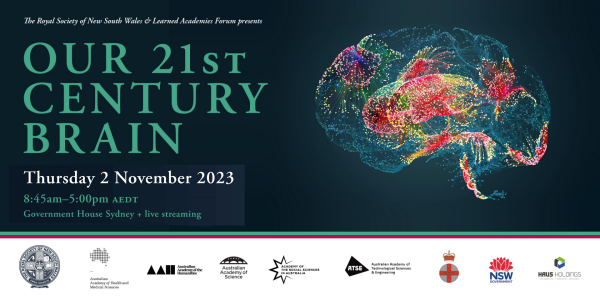 The Royal Society of NSW held its 2023 Royal Society of New South Wales and Learned Academies Forum at Government House Sydney on Thursday 2 November 2023. This year’s Forum focused on recent progress in unravelling the workings of the brain and opportunities to use our emerging understanding to promote human wellbeing well beyond the 21st Century.
The Royal Society of NSW held its 2023 Royal Society of New South Wales and Learned Academies Forum at Government House Sydney on Thursday 2 November 2023. This year’s Forum focused on recent progress in unravelling the workings of the brain and opportunities to use our emerging understanding to promote human wellbeing well beyond the 21st Century.
For more information and to access recordings of the event, please visit the RSNSW website.
YouTube and The Royal Society of New South Wales
At the tender age of 200, the Royal Society of New South Wales has launched its own YouTube Channel to make virtual events, lectures and performances freely available to the public. Take a look!
Click for more news from the Royal Society of New South Wales
The Royal Society of Victoria latest news:
Royal Society of Victoria’s Young Scientist Research Prizes
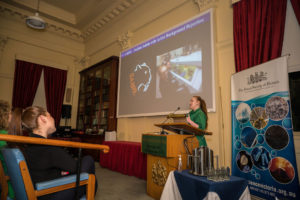 The Royal Society of Victoria has established four prestigious competitive prizes open to Victorian students in their final year of doctoral candidature to foster and recognise excellence in Victoria’s early career scientists. The prizes are in all areas of the Biomedical & Health Sciences, Biological Sciences (Non-human), Earth Sciences and Physical Sciences. Eight PhD finalists, two from each area, will present years of their research work in ten minutes. The successful candidates will each receive a certificate and a prize of $1000. Winners will also receive free student membership of the Royal Society of Victoria for a period of two years. Entries for the competition have closed.
The Royal Society of Victoria has established four prestigious competitive prizes open to Victorian students in their final year of doctoral candidature to foster and recognise excellence in Victoria’s early career scientists. The prizes are in all areas of the Biomedical & Health Sciences, Biological Sciences (Non-human), Earth Sciences and Physical Sciences. Eight PhD finalists, two from each area, will present years of their research work in ten minutes. The successful candidates will each receive a certificate and a prize of $1000. Winners will also receive free student membership of the Royal Society of Victoria for a period of two years. Entries for the competition have closed.
The competition will be held on Thursday 24 October 2024 from 6.00 – 9.00 pm AEDT in the Royal Society of Victoria rooms at 8 La Trobe Street Melbourne, Victoria and will be streamed online. The prizes are offered with the support of the Inspiring Victoria program and several sponsors. More information can be found on the relevant page of the Royal Society of Victoria website.
Surviving the Journey: Protecting Astronauts from Space Radiation
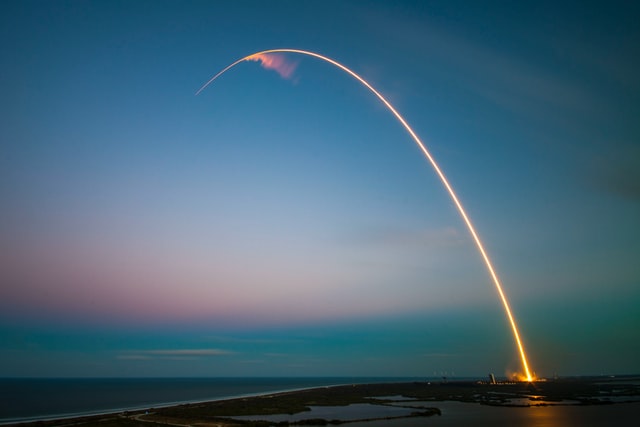 The vastness of space has beckoned many an adventurer. Yet with the exception of the Apollo astronauts, all astronauts thus far have never travelled outside of Low Earth Orbit. Remaining reasonably close to Earth, they are protected by its magnetic field. To travel further out would mean facing damaging cosmic and solar radiation.
The vastness of space has beckoned many an adventurer. Yet with the exception of the Apollo astronauts, all astronauts thus far have never travelled outside of Low Earth Orbit. Remaining reasonably close to Earth, they are protected by its magnetic field. To travel further out would mean facing damaging cosmic and solar radiation.
Outside the protective cocoon of the Earth’s magnetic field is a universe full of radiation. Unlike any of the radiation we encounter on Earth, space radiation consists of solar particles that burst out of the Sun at high speeds, and galactic cosmic rays that come from outside our solar system.
NASA’s Artemis Mission aims to send the first woman and next man to the Moon in 2024, but a lot of groundwork needs to first be done in order to make this a reality. Experimental physicist Dr Gail Iles works with RMIT University’s Space Science program, investigating ways to overcome the radiation barrier so that astronauts can survive long journeys, or even live indefinitely, in space…read more.
Why the world needs ecologists: a call to fight the extinction crisis
 A major threat to civilisation often goes ignored: the extinction crisis. And yet it is a crisis entirely of our own making as we continue to push nature to its limits. Around one million species are on the verge of disappearing off the planet, and the rate at which species become extinct is accelerating.
A major threat to civilisation often goes ignored: the extinction crisis. And yet it is a crisis entirely of our own making as we continue to push nature to its limits. Around one million species are on the verge of disappearing off the planet, and the rate at which species become extinct is accelerating.
‘Nature underpins all aspects of life,’ says Professor Brendan Wintle, the Director of the Threatened Species Recovery Hub. Ecosystems and their biodiversity provide numerous benefits to us by cleaning and purifying water and air, buffering storms and raging fires, storing carbon, supporting wildlife and healthy soils, and supplying food, water, materials, medicines, and important cultural and recreational spaces. But their ability to do so is rapidly diminishing…read more.
The Royal Society of Queensland latest news:
General science newsletter now free online

The Queensland Science Network, a collaboration between some 26 scientific and natural history societies, publishes a free online Newsletter on a semi-regular basis. The full set is available on the QSN website. Members of the public are warmly invited to subscribe. Please send any items of general science interest to the Editor Mr Col Lynam by email (newsletter AT scienceqld.org) for inclusion in the next issue.
“Springs of the Great Artesian Basin” published
 A Special Issue of the Proceedings of The Royal Society of Queensland has been published. All articles are available free of charge online at www.royalsocietyqld.org/2020-springs-special-issue-vol-126/.
A Special Issue of the Proceedings of The Royal Society of Queensland has been published. All articles are available free of charge online at www.royalsocietyqld.org/2020-springs-special-issue-vol-126/.
This is an outstanding work of scholarship and policy that includes scientific papers and opinion pieces, from a range of historical and contemporary perspectives. A limited number of printed copies is available for purchase: see www.royalsocietyqld.org/purchases/.
The Society anticipates that the volume will be an important work of reference to all those with an interest in the Great Artesian Basin as they grapple with the best methods of managing and conserving it.
Publications available
 Orders are being taken for several issues of the Proceedings of The Royal Society of Queensland:
Orders are being taken for several issues of the Proceedings of The Royal Society of Queensland:
Volume 125 –The Land of Clouds Revisited: The Biodiversity and Ecology of the Eungella Rainforests – $35 plus $10 postage.
Volume 126 – Springs of the Great Artesian Basin – $50 plus $15 postage.
Volume 127 – A Rangelands Dialogue: Towards a Sustainable Future – $35 plus $10 postage.
Volume 128 – Regular annual issue 2020 – $35 plus $10 postage.
The table of contents of each of these printed works is or will soon be available on the Proceedings page.
Please proceed to the Purchases page to make payments.
Click for more news from the Royal Society of Queensland
News and Events from other Australian Royal Societies:
The Royal Society of Tasmania
The Royal Society of South Australia
The Royal Society of Western Australia
